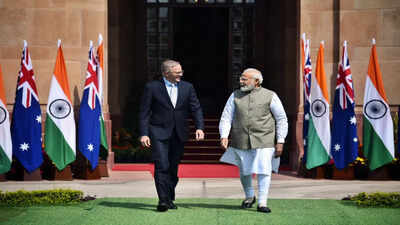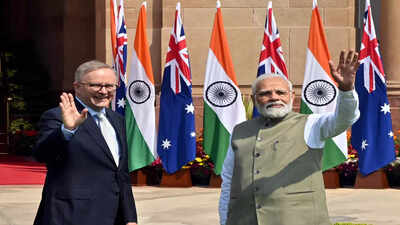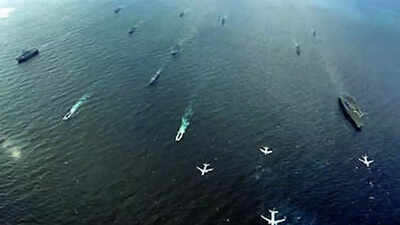Top Searches
- News
- India News
- With focus on Indo-Pacific, India & Australia assert need for stronger defence, trade ties
With focus on Indo-Pacific, India & Australia assert need for stronger defence, trade ties
NEW DELHI: The need for stronger defence, security and trade ties dominated the India-Australia summit Friday with both leaders, Prime Minister Narendra Modi and his counterpart Anthony Albanese, calling for a stable, open, inclusive and prosperous Indo-Pacific, a region where Chinese assertiveness remains a source of anxiety for many countries.
Albanese was in India on his way to the United States where President Joe Biden will host the Australian and UK leaders to formalise the AUKUS security pact which will have Australia operating nuclear-powered submarines to defend the "rules-based international order" in the region from Chinese aggression, even as it looks to improve ties with Beijing.
While the two leaders didn’t specifically refer to the Ukraine situation in their media remarks, a joint statement later said they expressed concern about the conflict and humanitarian situation in Ukraine, reiterating the need for an immediate cessation of hostilities and a peaceful resolution to the conflict. "They reiterated that the conflict was causing immense human suffering, exacerbating existing fragilities in the global economic system," it said. Unlike the last summit though, which was held virtually in March 2022 with Albanese’s predecessor Scott Morrison, the joint statement didn’t mention UN Charter, international law and respect for sovereignty and the territorial integrity of States in the context of Ukraine. Official sources said Ukraine wasn’t really a major topic of discussion, unlike in Modi’s recent meetings with European leaders, particularly German Chancellor Olaf Scholz.
The focus was more on the Indo-Pacific with Albanese saying the 2 leaders held discussions on the prevailing global uncertainties and committed to defence and security cooperation to address shared challenges and work towards, a stable, open and prosperous Indo-Pacific where, as both countries said in their joint statement, sovereignty, territorial integrity and rules-based order are respected.

Albanese welcomed the upcoming Malabar exercise which Australia will host in August and also increased information-sharing in defence with India, including in the maritime domain. While it’s not officially a Quad exercise, it will see participation by the navies of all Quad countries. Modi and Albanese discussed cooperation under Quad and the latter invited the PM for the Quad summit that Australia will host in May.
Modi said security cooperation was an important pillar of the Comprehensive Strategic Partnership between the 2 countries and that they had a detailed discussion on maritime security in the Indo-Pacific region and increasing mutual defence and security cooperation. "In the field of defence, we have made remarkable agreements in the last few years, including logistics support for each other's armed forces. There is also regular and useful exchange of information between our security agencies, and we discussed on further strengthening this,’’ he said. According to the joint statement, the 2 PMs agreed that, as a practical step, India and Australia may continue to explore ``conduct of aircraft deployments’’ from each other’s territories to build operational familiarity and enhance maritime domain awareness.

On trade, Albanese said both leaders wanted an early conclusion of the ambitious Comprehensive Economic Cooperation Agreement (CECA) and he was hopeful the deal will be finalised this year.
There was also a strong condemnation of all forms of terrorism with the leaders emphasising on the need to combat all those who encourage, support and finance terrorism or provide sanctuary to terrorists and terror groups.
"They called upon all countries to work together to root out terrorist safe havens and infrastructure, disrupt terrorist networks and their financing channels and halt use of terrorist proxies and cross-border movement of terrorists,’’ said the joint statement, while reiterating their condemnation of terrorist attacks in India and Australia, including the Mumbai and Pathankot attacks.

Albanese was in India on his way to the United States where President Joe Biden will host the Australian and UK leaders to formalise the AUKUS security pact which will have Australia operating nuclear-powered submarines to defend the "rules-based international order" in the region from Chinese aggression, even as it looks to improve ties with Beijing.
While the two leaders didn’t specifically refer to the Ukraine situation in their media remarks, a joint statement later said they expressed concern about the conflict and humanitarian situation in Ukraine, reiterating the need for an immediate cessation of hostilities and a peaceful resolution to the conflict. "They reiterated that the conflict was causing immense human suffering, exacerbating existing fragilities in the global economic system," it said. Unlike the last summit though, which was held virtually in March 2022 with Albanese’s predecessor Scott Morrison, the joint statement didn’t mention UN Charter, international law and respect for sovereignty and the territorial integrity of States in the context of Ukraine. Official sources said Ukraine wasn’t really a major topic of discussion, unlike in Modi’s recent meetings with European leaders, particularly German Chancellor Olaf Scholz.
The focus was more on the Indo-Pacific with Albanese saying the 2 leaders held discussions on the prevailing global uncertainties and committed to defence and security cooperation to address shared challenges and work towards, a stable, open and prosperous Indo-Pacific where, as both countries said in their joint statement, sovereignty, territorial integrity and rules-based order are respected.

India-Australia PMs discuss economic relationship in bilateral talks
Albanese welcomed the upcoming Malabar exercise which Australia will host in August and also increased information-sharing in defence with India, including in the maritime domain. While it’s not officially a Quad exercise, it will see participation by the navies of all Quad countries. Modi and Albanese discussed cooperation under Quad and the latter invited the PM for the Quad summit that Australia will host in May.
Modi said security cooperation was an important pillar of the Comprehensive Strategic Partnership between the 2 countries and that they had a detailed discussion on maritime security in the Indo-Pacific region and increasing mutual defence and security cooperation. "In the field of defence, we have made remarkable agreements in the last few years, including logistics support for each other's armed forces. There is also regular and useful exchange of information between our security agencies, and we discussed on further strengthening this,’’ he said. According to the joint statement, the 2 PMs agreed that, as a practical step, India and Australia may continue to explore ``conduct of aircraft deployments’’ from each other’s territories to build operational familiarity and enhance maritime domain awareness.

'I thank PM Modi for very warm welcome. Australia & India are great friends': Australian PM Anthony Albanese
On trade, Albanese said both leaders wanted an early conclusion of the ambitious Comprehensive Economic Cooperation Agreement (CECA) and he was hopeful the deal will be finalised this year.
There was also a strong condemnation of all forms of terrorism with the leaders emphasising on the need to combat all those who encourage, support and finance terrorism or provide sanctuary to terrorists and terror groups.
"They called upon all countries to work together to root out terrorist safe havens and infrastructure, disrupt terrorist networks and their financing channels and halt use of terrorist proxies and cross-border movement of terrorists,’’ said the joint statement, while reiterating their condemnation of terrorist attacks in India and Australia, including the Mumbai and Pathankot attacks.

Watch: How PM Modi’s cricket diplomacy with Australian PM Anthony Albanese played out in Ahmedabad
Start a Conversation
FOLLOW US ON SOCIAL MEDIA
FacebookTwitterInstagramKOO APPYOUTUBE












